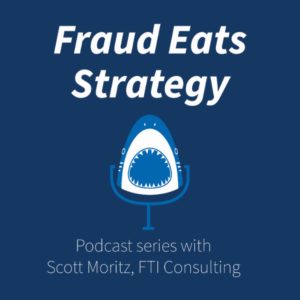
In this second episode of Fraud Eats Strategy, Scott Moritz speaks to Neil Barofsky, a partner at Jenner & Block and the former Special Inspector General of the Troubled Asset Relief Program about these issues. We will explore the increased discovery of financial crimes that occur in a down cycle of the economy and how organizations can use fraud risk assessments to identify fraud, pursue avenues of recovery and strengthen their organizations against the potential negative consequences of fraud.
Join us each week as we take a deep dive into the various forms of fraud across the world and discuss crime families, penny stock boiler rooms, international money launderers, narco-traffickers, oligarchs, dictators, war lords, kleptocrats and more.
Scott Moritz is a leading authority on white-collar crime, anti-corruption, and in the evaluation, design, remediation, implementation, and administration of corporate compliance programs, codes of conduct. He is also considered an authority in the establishment, training, and oversight of the investigative protocols carried out by financial intelligence, corporate security, and internal audit units.



